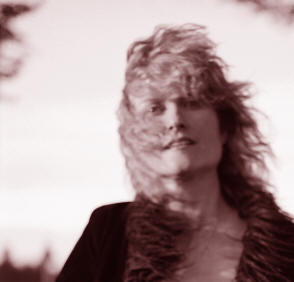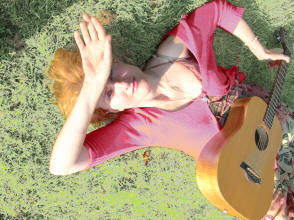|
Edited by Frank R. Shaw, FSA Scot, Dawsonville, GA, USA
Email:
jurascot@earthlink.net
Several
years ago eminent Burns scholar and professor Kenneth Simpson contacted me
about a young singer he hoped would be coming to the States. He wanted me to
know how good she was and for me to be sure to attend her concert.
Unfortunately, fate never decreed that I have that opportunity, but I have
been able to collect her songs. That young singer Ken was telling me about
is none other that the highly successful Eddi Reader. She has had a CD out
on Robert Burns for a few years and has just now released it in a deluxe
format including many other songs not included in the original. I look
forward to receiving the newer version because I plan for the first time on
Robert Burns Lives! to review her CD.
In the
meantime, this talented young lady has written a great article on “What
Burns Means to Me” and it is my privilege to share it with our readers. Get
ready for a phrase that you probably never heard before – “Burns police”.
My advice to Eddi Reader is to be yourself! That is what has brought her to
the top of her field of entertainment and that is what will keep her there.
Also, as far as the “Burns police”, just remember that your interpretation
of the songs of Burns is no more that what he did when he literally rewrote
over 350 Scottish songs by giving them his own interpretation. Eddi, you’ll
be just fine; don’t spend a moment worried about the “Burns police”. Burns
had some very harsh things to say about such people. Sing your songs as
songs of joy so we can celebrate Robert Burns even more.
Eddi
Reader Biography
Eddi
Reader grew up in Glasgow and Irvine, Scotland and it was in those towns
that she learned to use music as a vehicle for communicating with others
through busking and performing at the local folk clubs. In the early 1980s,
Eddi travelled around Europe with circus and performance artists before
moving to London where she quickly became a sought after session vocalist.
She famously harmonized with Annie Lennox touring with the Eurythmics, after
her time with successful punk outfit Gang of Four. It was the short-lived
but warmly remembered Fairground Attraction that really brought her into the
limelight and to the attention of a much wider audience. The single
‘Perfect’ and parent album First of a Million Kisses both topped the British
charts.
However, it was her subsequent albums which signalled her increasing ability
to assimilate different musical styles and make them all very much her own.
Her unerring instinct for fine material, whether self penned, collaborative
or a carefully chosen cover version resulted in Mirmama (1992), Eddi Reader
(1994), Candyfloss & Medicine (1996), Angels & Electricity (1998), Simple
Soul (2001)
Through these years Eddi based herself in London, but in 2001 she decided to
move home to Glasgow where she recorded the classic ‘Songs Of Robert Burns’
album released to international acclaim in 2003. Awarded the MBE in 2006 for
services to singing, she took her Burns songs on tour all over the world and
found connections to the bard everywhere from Kolkata, India to Sydney,
Australia. In 2006 she released ‘Peacetime’ on Rough Trade Records featuring
the finest traditional players in the United Kingdom and produced by Folk
Musician of The Year, John McCusker. Constant touring with her band has
created a magical organic chemistry between Eddi and her players and the
results of this relationship can be found on her upcoming release…
‘Love Is The Way’, Eddi Reader’s seventh solo album, released in March
2009 on Rough Trade Records.
Produced by Eddi herself, it is her best work so far. Recorded in a matter
of days with her band in Glasgow, the record has captured the award winning
songstress in her finest form. Songs written with her long time writing
partner Boo Hewerdine, songs written with her life partner John Douglas
(The Trashcan Sinatras) and a song from the magical Irish singer/songwriter
Declan O’Rourke as well as a rare Brian Wilson composition, an Eddi/Fleetwood
Mac ‘mash up’, and a song from Dublin songwriter Jack Maher.
From the traditional to the contemporary, Eddi brings to joyous life all
forms of song. Her taste in co-writers, writers, songs and players is
impeccable and anything with her name on it is guaranteed musical treasure.
Whilst the perfection of her technique is widely acknowledged, what sets
Reader apart is the depth and quality of the emotional performance; her
ability not only to move the listener but to connect her experience to that
of her audience. Her passion and instinct move people in a way reminiscent
of those who have influenced her work. Her rare blend of meltingly true
vocals and towering romanticism combine with an astute and pragmatic nature
to make her a unique and powerful figure in contemporary British music. She
has effortlessly developed into one of popular music’s most thrilling and
affecting performers.
What
Burns Means to Me
By Eddi Reader


My 2003
Burns songs album came into my world as a small idea about trying out some
tunes that I grew up with, and had the opportunity to hear in the folk clubs
throughout the west of Scotland, when I started singing after school. The
album took a journey of its own as others became involved. Burns provided
much of the music I heard growing up and gave me the words to hang my muse
upon. Without those songs I would have had perhaps a less colorful
experience and definitely less choice of material when developing my
abilities. If I had been born in Manchester I might have missed out on that
material.
Speaking
as a woman Burns would have been someone to fall for, but maybe not to rely
on. That kinda describes most of the men I bumped into romantically during
my twenties.
He may
have left us long ago, but the themes he left behind were timeless. The
pictures of people he took with those writings are such accurate photographs
of who we all are and the feelings we all have that his words will always be
relevant.
As a
teenager, I moved with my family from Glasgow to Irvine, and it was while
going to school there that I first realized there was a big noise about
Burns. I was from the Big City and Big Cities are full of pop culture and
“the new” Irvine and Kilmarnock seemed to be holding fast to something
ancient and Burns was part of that. The first experience of that was in the
language the other kids, and the insistence of the school’s English
department to use Burns. They thought Glasgow was exotic; I thought they
were right.
I see
Burns as real and walking, talking, dancing, worried, smiling human being.
With all of that I empathise and it keeps me close to how he might have
felt. I can share it personally.
I used to
be braver about singing Burns’s words before I made the album. I would hear
the words and the melody and adjust them to suit the soaring passion I felt.
I was carefree with it. Now I am more careful, which can be a bad thing.
I get
responses from listeners who really like it, but there are certain “iron
bars” around these songs, and you have the Burns police”, who, God bless
them, have maintained and cared for the Bard’s memory and probably have the
same passion about these words as I have. But I am a musician first and a
historian last. I get my kicks from his creativity, not from the documents.
Burns
could have been born in 1959 for all I care. When I sing Dainty Davie, for
example, I am more involved in the way the line “there I’ll spend the day wi
you” floats melodically over the open chord in the guitar tuning I have
found, and how it makes me fill with longing for a lover, than whether I
have the old melody right. If Burns was here and moaned about it I would
probably let the song go. For if you can’t share the way it feels, then it’s
not worth anything except as something I keep privately in my own head.
(FRS:
2-25-09) |
